14 Reasons Your Car Jerks When Braking, Slowing Down, or Stopped
Our vehicles are vital in today’s fast-paced world. So when they act up, it’s concerning. Few things alarm more than unexpected jerking when braking, slowing, or stopped.
Let’s explore the potential reasons behind this unnerving issue, broken down by whether you’re applying the brakes, coasting to a stop, or when you’re actually sitting at a stop because nobody wants to experience that again.
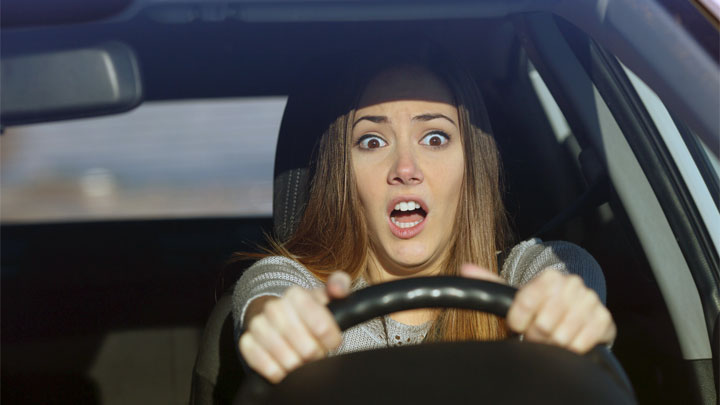
Causes of a Car That Jerks When Braking
It is not uncommon for motorists to feel a “jerking” sensation when braking. While such issues are far from rare, they do require ample attention, in order to remedy the situation at hand.
The following are several of the most common reasons that a vehicle jerks when its brake pedal is depressed.
#1 – Warped Rotors
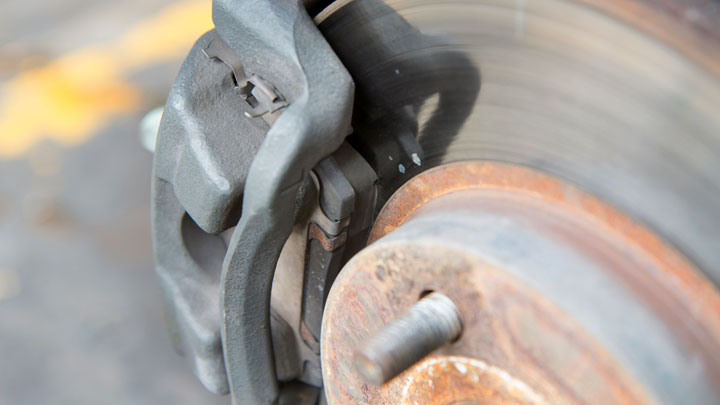
Warped brake rotors are the number one cause of a jerking sensation when applying a vehicle’s brakes. With time, a vehicle’s brake rotors can become distorted due to overheating, excessive wear, or rapid cooling.
This distortion is felt as a vehicle’s brake pads press against the affected brake rotors, causing a noticeable pulsation.
See Also: Replace vs Resurface Rotors
#2 – ABS Actuation
The actuation of a vehicle’s ABS (Anti-Lock Braking System) valve will cause a substantial jerking sensation when coming to a stop.
If you have attempted to stop abruptly, especially in wet conditions, this effect is nothing to be alarmed by. However, if your vehicle’s ABS system begins actuating at random stops, further diagnosis will be required.
#3 – Compromised Brake Booster
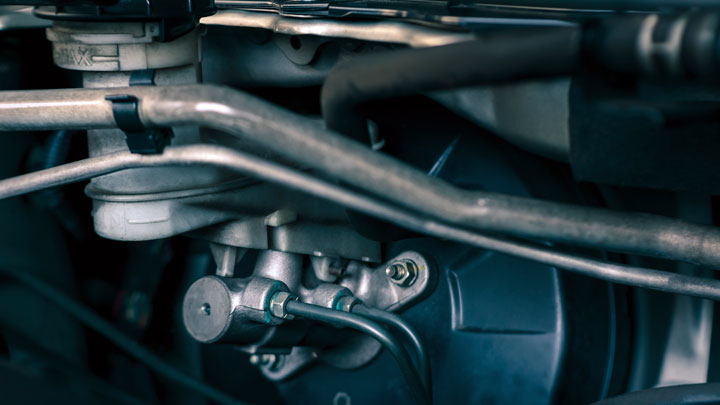
A faulty vacuum-assist brake booster is another likely cause of vehicle vibration when braking.
A vehicle’s brake booster operates by manipulating a diaphragm under vacuum when a vehicle’s brake pedal is applied. If this diaphragm is compromised in any manner, a shuttering may present itself during brake applications.
#4 – Seized Brake Caliper
A severely seized brake caliper can also cause a vehicle to jerk when applying the brakes. These jolts and jumps result from the binding that takes place, as a vehicle’s brake pads are wedged against its corresponding rotors.
In a number of cases, this condition is also accompanied by an audible chattering noise.
#5 – Worn Steering/Suspension Bushings
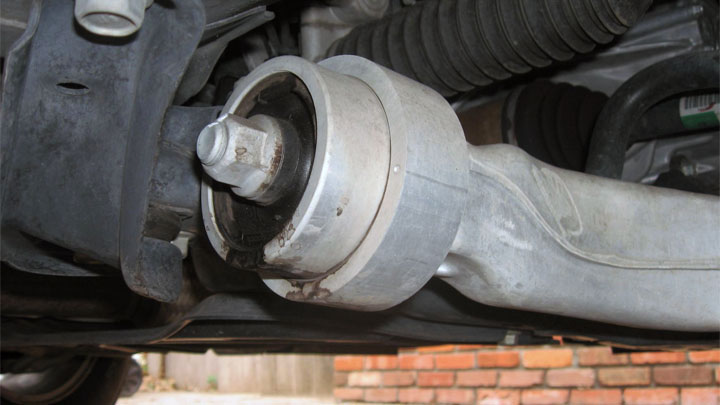
The typical vehicle utilizes many different bushings (ie: control arm bushings, shock absorber bushings, steering rack bushings, etc.) to dampen vibration within a vehicle’s front end.
However, these bushings do tend to wear with time, causing a noticeable increase in otherwise muted vibrations. This condition tends to express itself most prevalently during braking.
Causes of a Car That Jerks When Slowing Down
A vehicle can also jerk when slowing down, even in the absence of a defined brake application. The cause of this unusual vibration should be isolated and repaired, as soon as it is practical to do so.
The following are several of the most common reasons that a vehicle jerks when slowing to a stop.
#6 – Transmission Issues
A jerking sensation when slowing to a stop is often indicative of a transmission-related issue like a bad valve body or TCM.
This tends to be true of both automatic and manual transmissions, as they attempt to regulate their gearing and speed to the situation at hand. Further diagnostics will be required to uncover the full extent of such issues.
#7 – Faulty MAF Sensor
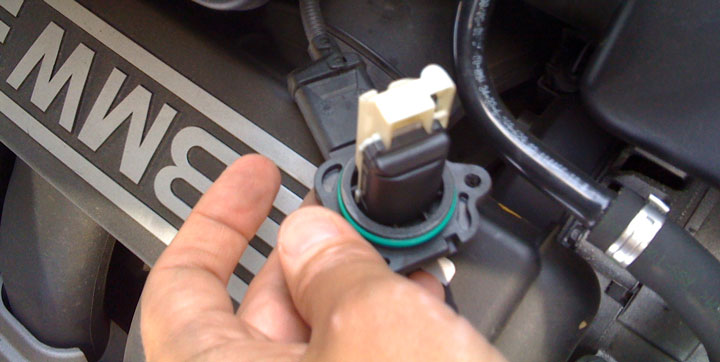
It is not uncommon for a faulty Mass Airflow Sensor (MAF) to cause an engine to jerk as a vehicle slows. A Mass Airflow Sensor provides an engine’s ECM/PCM with feedback pertaining to the amount of air flowing through the intake tract.
This feedback is used to calculate an engine’s fuel trims in real time. However, the presentation of inaccurate data can cause combustion irregularities.
#8 – Compromised Ignition Coils
An engine’s ignition coils provide a well-timed spark to each particular cylinder. However, as an ignition coil begins to fail, it often leads to the misfires at low speeds, which are often felt as bucking or jumping.
While such issues can also arise while cruising at high speeds, the jerking is far more prevalent during acceleration, as relative engine load is significantly reduced.
#9 – Sticking Throttle Body
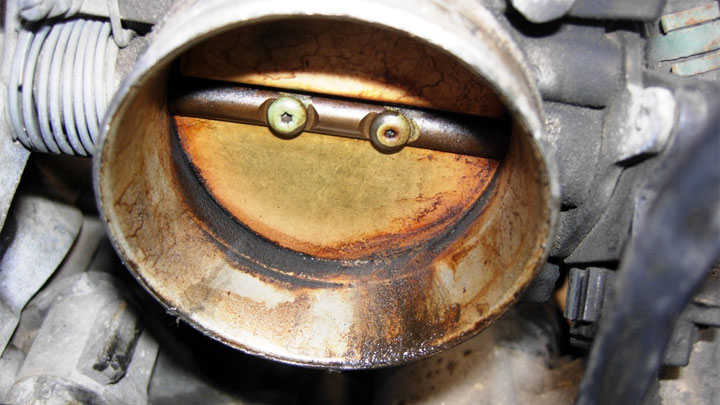
In certain instances, a certain degree of jerking can occur when an engine’s throttle body begins to stick. The throttle body serves as the metering device for all incoming air introduced into an engine’s intake manifold for combustion.
If a throttle body sticks, or otherwise fails to actuate to the desired position to meet engine demand, a hesitation of sorts often comes as the result.
#10 – Vacuum Leaks
Yet another common cause of vehicle jerking during slow down is pronounced vacuum leaks.
An older vehicle often relied upon engine vacuum to facilitate a number of critical functions, including EGR operation. Worse yet, a leak within a vehicle’s vacuum system can lead to severe, yet erratic, misfires, which are often only felt when slowing to an eventual stop.
Causes of a Car That Jerks When Stopped
Though less common than the conditions described above, a vehicle can also jerk noticeably when sitting at a stop. For many, this is a cause for alarm and can cause a certain amount of anxiety until remedied.
The following are several of the most common reasons that a vehicle jerks while sitting at a complete stop.
#11 – Ignition System Issues
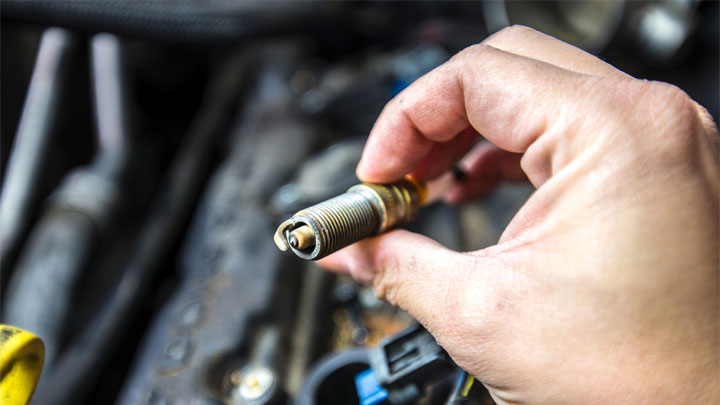
A jerking or shaking felt at idle, when stopped at a light, can often be attributed to one or more ignition system issues. Some of the most common of these issues include worn spark plugs, aging spark plug wires, and faulty coil packs.
In older vehicles, a worn or damaged distributor cap or rotor button were often to blame for issues of this general type.
#12 – Fuel Delivery Problems
A miss detected while idling is often caused by an issue within an engine’s fuel system. A vehicle can experience a host of fuel system-related issues, including a clogged fuel filter, defective fuel pressure regulator, or malfunctioning injectors.
The bulk of these issues seem to be most easily noticed when sitting idle in a parking lot, or at a stop light.
#13 – Inefficient Air Delivery
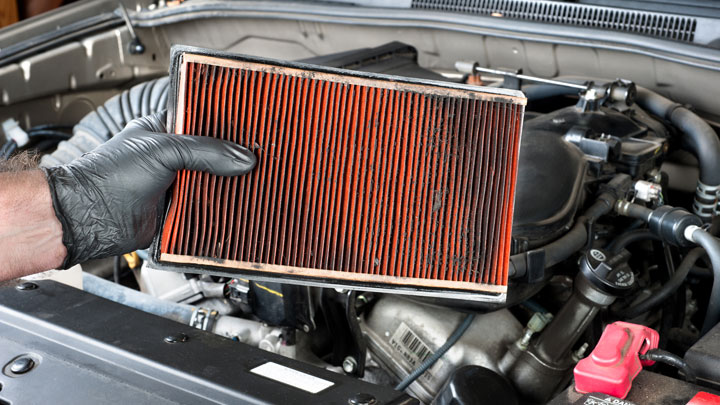
An internal combustion engine requires a steady supply of clean intake air at all times, to facilitate proper operation. If an engine is starved for air at any point, combustion efficiency and overall performance plummet, typically causing a severe misfire.
This misfire can be easily detected at idle, or during periods of low engine load. Problems of this nature can be attributed to throttle body defects or the prolonged use of a dirty or clogged air filter.
#14 – Vacuum Leaks
Vacuum leaks are among the most common causes of erratic idle, due to their allowance of unmetered air into an engine’s intake tract. This air is not accounted for by an engine’s ECM/PCM, therefore leading to a notably lean condition.
As a result, combustion efficiency is significantly stifled, and engine performance takes a nosedive of unmatched proportions.
- P0480 Code (Symptoms, Causes, and How to Fix) - Apr 19, 2024
- Car Temperature Gauge Stopped Working? (Here’s Why) - Apr 15, 2024
- Ignition Coil vs Coil Pack (What’s the Difference?) - Apr 8, 2024

My Honda Accord SDA 2.0 (2007) jerks when I start moving or when stopped. But everything was okay once the car had already moved.
my car also like always smh. when it idles for a few seconds like at a red light it starts to try an take off when foots on break then when i release break it jerks real fast then slows down an i can have pedal to floor an it won’t go over 30. but eventually speed picks up. also all the lights like check engine turn on smh sometimes it dies out lol
Could the vehicle be in limp mode? Check for codes, see if there is a fault code stored in the ECU. Limp mode is designed to protect the vehicle when no sensor input or erroneous data is detected by the ECU.
If there are no codes, perhaps you have an intermittent spark or fueling problem. What is the year, make, and model? How long has it been since the spark plugs were changed?
My car produces a noticeable intermittent forward jolt as I am engine braking, so I’m going to look into these possible reasons. Thanks
I have a RAV4 when I step on the brakes it lurches forward and ravv really high scary it has been scan but nothing is showing any damage or defects
I’m not sure but that sounds pretty dangerous. It’d be worth getting a professional to take a look at it.
I have an 07 Toyota 4 Runner. When I come to a complete stop it jerks some. Is that a transmission problem or could it be something else?
I don’t know. Generally with a transmission problem you would feel the jerking while you’re giving the vehicle some gas. Can you tell where the jerking is coming from? You might need to take it into a shop to have them diagnose the issue.
2005 Buick Lacrosse 3800 series III motor, When slowing down to a full stop, intermittently the engine will have a small jump/thud. When slowing down to take a turn after breaking for turn and giving acceleration the engine hiccups/pauses for a second or two then kicks in with a bigger jump or thud. My question, is it transmission issues or no and if so/no what exactly could be the culprit?
I don’t know. Does it feel like the engine is stumbling or like the transmission is slipping? If it feels like a stumbling engine, when was the last time the spark plugs were replaced? You might need to have a mechanic take it for a test drive. Sometimes it’s hard to tell if it’s an engine issue or transmission issue without doing some diagnostics, depending on the symptoms.
Secondly the car has been scanned and nothing was dictated, Engine check light shows but it doesn’t blink
My car jerks to the front as if a sudden break is applied anytime I slow or press break slowly . Please what is going on
Can’t know for sure without an inspection, but here are a few possibilities. You could have aggressive brake pads that bite hard with very little pedal pressure. You could have an issue with the brake master cylinder or brake lines that are causing excessive brake pressure. You could have a bad engine mount or control arm bushing that causes excessive motion when braking, but I think this is less likely. You could also potentially have a caliper that is starting to seize. If it’s the caliper, a rebuild or replacement may be necessary.
Please my Honda Civic jerk when I’m slowing down on the road, when the jerk starts, it affect the brake and the steering sometimes size, I have to pump the brake hard before the car will stop, when I off the car and on it, it runs normal sometimes and start jerking again, please help me because I have tried changing air filter, spark plug, cleans my fuel pump and nothing changes.
Check your entire braking system: the pads, calipers, and bleed the brakes. It sounds dangerous to drive like that and you should get it fixed as soon as possible. If you are not comfortable doing the work yourself, take it to a shop.
Did you think that the brake caliper may have lost a bolt??
It’s possible. The good news is it’s pretty easy to check if any caliper bolts are missing or backing out.
No only when i brake or go fast on speed then the car vibrates like crazy
2022 dodge 300 miles 5.7 hemi jerks when coming to a stop
Does it feel like the jerking is coming from the braking system or the powertrain? Does the vehicle still jerk when you let off the throttle and don’t apply brakes?